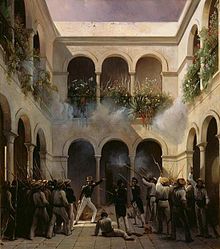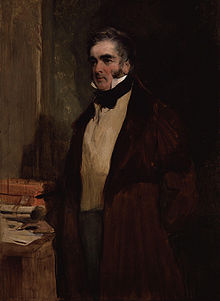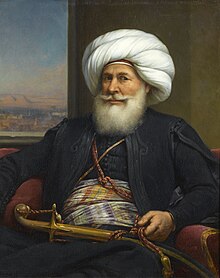1828 - The Republic of Mexico had long since cast off the Spanish King, then a local Emperor. The initial President's term (Guadeloupe Victoria) went well enough largely because the 1st President had borrowed like there was no tomorrow to maintain the necessary funds to control the country. However, within a few years, the state debt had grown exponentially.
Assorted coup d'états became the norm and no President after Guadeloupe Victoria managed a peaceful office without facing a (usually successful) coup by various Generals or the political opposition.
Naturally, this unrest harmed the country's economy. Violence was routine and riots became the norm in the larger cities of Mexico. Looting was common, as was the occasional targeting of foreigners. A French pastry chef named Remontel was among the victims. Indeed, he claimed, it was Mexican military personnel of one faction or another whom had done the looting. While the loss of some bread wasn't the end of the world, a great deal of expensive cooking equipment had been stolen or damaged and Remontel was forced to order more from France. The Frenchman approached the government for reimbursement given it was allegedly Mexican soldiers that did the deed. However, he was laughed out of the office. Such things were common and the bankrupt nation could hardly be expected to pay off cases of looting to anyone whom approached it.
While foreigners were not necessarily a specified target, many Frenchmen, Britons, Spanish, Americans, etc, eventually would complain to their Ambassadors, Councils or whomever would answer a letter of their plight. Few recipients cared. No one was forced to live in that rapidly collapsing nation. If one didn't like it, they were free to go home.
However, by 1836, it was becoming increasingly plain that Mexico could not (nor would not) repay the huge debts they owed to French, British, Dutch, American, etc banks and, about that, the foreign governments most certainly DID care. King Louis Philippe I of France was repeatedly badgered by his subordinates to approve some sort of intervention against the Mexican Government. Initially, he desired it to be in conjunction with the British or Spanish. However, the diplomats failed and his ministers were determined to flex France's muscles. Though it had been Louis Philippe's predecessor, the loathed Charles X, that had initiated the invasion of Algiers years earlier, Louis Philippe continued to give the colonization of North Africa tepid support. Many (including some Britons whom were wary of a resurgent France) viewed this as a threat and opposed any such partnership for such limited gains. Had they agreed, it is possible that the turmoil of the 1830's and 1840's may have been avoided as Britain would be in a better position to keep the French aims restricted to financial reimbursement of debt.
In the end, in 1836, France decided to act upon its own. Britain's attention would soon be shifted elsewhere anyway.
France dispatched a fleet with 5000 troops intent on occupying the primary port of Mexico, Veracruz, and blockading all trade until France received satisfaction. Oddly, the justification of the act was not the repayment of loans offered to Mexico in good faith but a silly claim by a Pastry Chef demanding restitution for his losses. French "negotiators" would demand 600,000 pesos for damages to Mr. Remontel's shop, a figure even the baker thought absurd given the average baker made 1 peso per day. Even the highest valuation of his equipment loses were in the hundreds of pesos, not 600,000.
With this flimsy pretext, the French fleet arrived off the coast of Veracruz.
Assorted coup d'états became the norm and no President after Guadeloupe Victoria managed a peaceful office without facing a (usually successful) coup by various Generals or the political opposition.
Naturally, this unrest harmed the country's economy. Violence was routine and riots became the norm in the larger cities of Mexico. Looting was common, as was the occasional targeting of foreigners. A French pastry chef named Remontel was among the victims. Indeed, he claimed, it was Mexican military personnel of one faction or another whom had done the looting. While the loss of some bread wasn't the end of the world, a great deal of expensive cooking equipment had been stolen or damaged and Remontel was forced to order more from France. The Frenchman approached the government for reimbursement given it was allegedly Mexican soldiers that did the deed. However, he was laughed out of the office. Such things were common and the bankrupt nation could hardly be expected to pay off cases of looting to anyone whom approached it.
While foreigners were not necessarily a specified target, many Frenchmen, Britons, Spanish, Americans, etc, eventually would complain to their Ambassadors, Councils or whomever would answer a letter of their plight. Few recipients cared. No one was forced to live in that rapidly collapsing nation. If one didn't like it, they were free to go home.
However, by 1836, it was becoming increasingly plain that Mexico could not (nor would not) repay the huge debts they owed to French, British, Dutch, American, etc banks and, about that, the foreign governments most certainly DID care. King Louis Philippe I of France was repeatedly badgered by his subordinates to approve some sort of intervention against the Mexican Government. Initially, he desired it to be in conjunction with the British or Spanish. However, the diplomats failed and his ministers were determined to flex France's muscles. Though it had been Louis Philippe's predecessor, the loathed Charles X, that had initiated the invasion of Algiers years earlier, Louis Philippe continued to give the colonization of North Africa tepid support. Many (including some Britons whom were wary of a resurgent France) viewed this as a threat and opposed any such partnership for such limited gains. Had they agreed, it is possible that the turmoil of the 1830's and 1840's may have been avoided as Britain would be in a better position to keep the French aims restricted to financial reimbursement of debt.
In the end, in 1836, France decided to act upon its own. Britain's attention would soon be shifted elsewhere anyway.
France dispatched a fleet with 5000 troops intent on occupying the primary port of Mexico, Veracruz, and blockading all trade until France received satisfaction. Oddly, the justification of the act was not the repayment of loans offered to Mexico in good faith but a silly claim by a Pastry Chef demanding restitution for his losses. French "negotiators" would demand 600,000 pesos for damages to Mr. Remontel's shop, a figure even the baker thought absurd given the average baker made 1 peso per day. Even the highest valuation of his equipment loses were in the hundreds of pesos, not 600,000.
With this flimsy pretext, the French fleet arrived off the coast of Veracruz.







